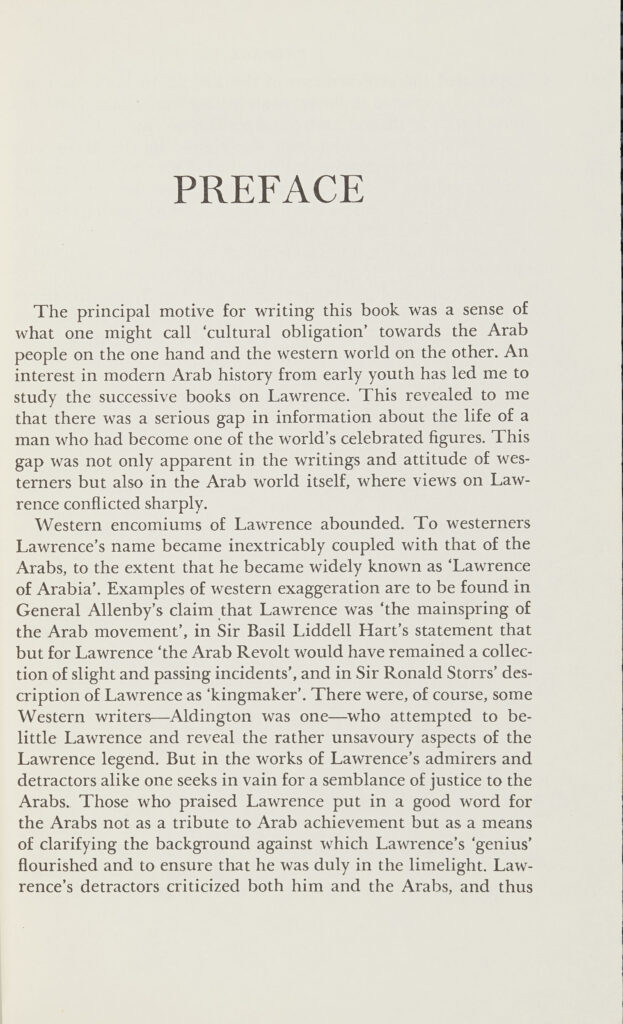
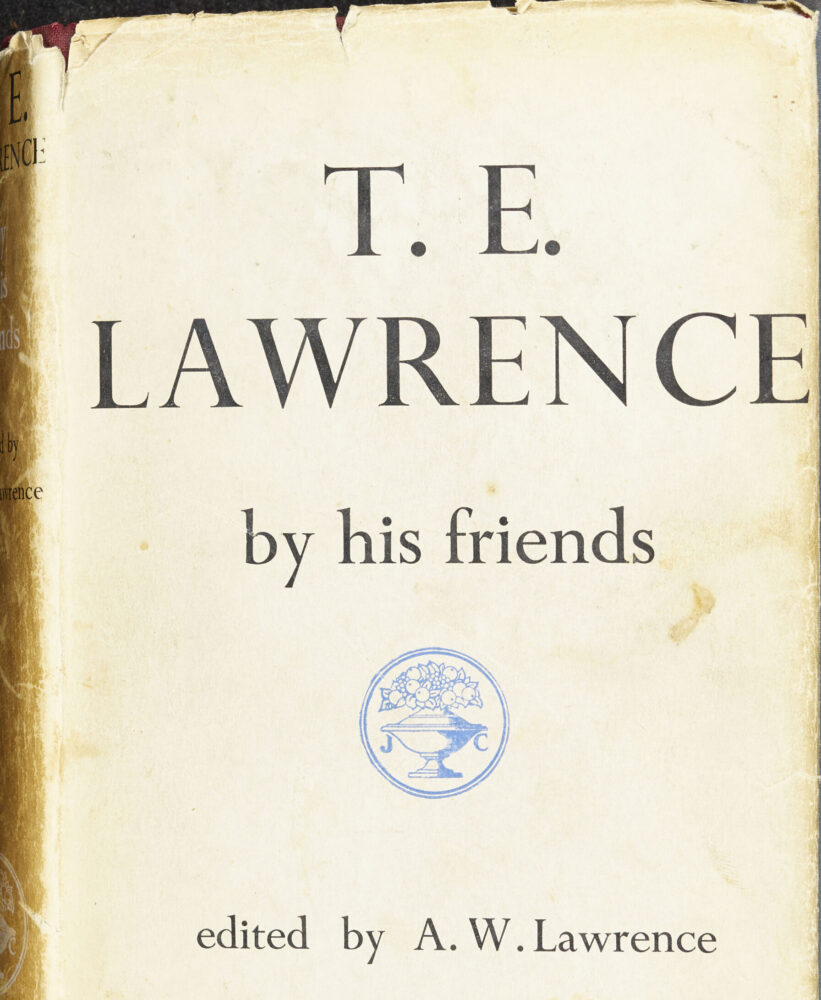

After Lawrence’s death, his many friends and acquaintances from all walks of life, military and civilian, arts and literature, archaeologists and colonialists, school friends and mentors, wanted to record their impressions of him. Their motivations were various: for posterity, to make claims for a hero they saw as almost a spiritual figure, to condemn someone who they saw as suspicious and/or for attention and money! Wilson’s collection contains memoirs and interviews in audio and paper form.
Sir Compton Mackenzie
Notes on a visit by Arabella Rivington to Sir Compton Mackenzie (1883–1972), author of Whisky Galore. Mackenzie had corresponded with Lawrence but never met him, yet he claimed that Lawrence “was given to flights of imagination.” Mackenzie nonetheless believed that “many of the startling stories of Lawrence’s eccentricity” came from Aubrey Herbert.
Wilson Papers, P450/R/REM/8/4/20


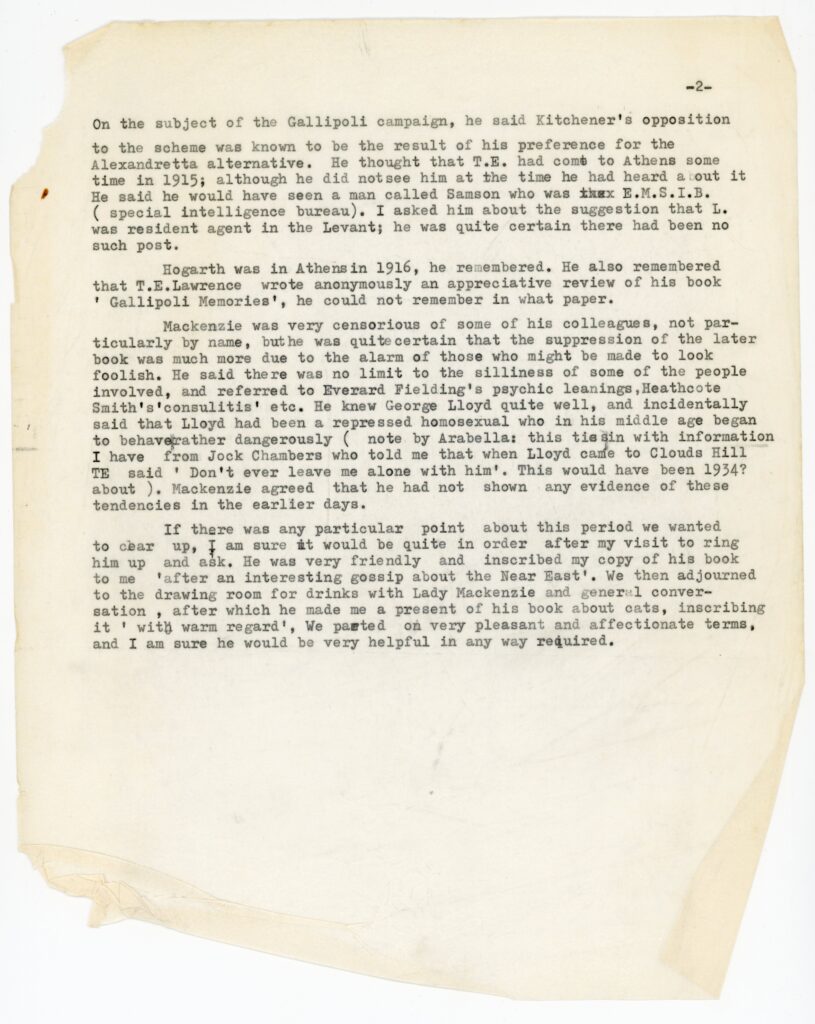
Henry Williamson
The writer Henry Williamson (1895-1977), author of Tarka the Otter, was a devoted admirer of Lawrence, after meeting him in 1928. This postcard to the Bloomsbury writer David Garnett (1892-1981) written in 1938 discusses the publication of his letters from T.E. Lawrence: “nothing need be cut, as far as I am concerned he was the least personal of men”.
Wilson Papers, P450/R/COR/11



Faridah el Akle
Faridah el Akle (b. 1882) was Lawrence’s Arabic teacher at the American Mission School in Jebail (Bint Jbeil), Lebanon, in 1911 and remained a good friend. In this extract from an interview, she struggles to express the profound effect Lawrence had on her, saying, “I am the only Easterner who he got to know well and stay friends…” and that “I know him as if I was a mother or I was an older sister to him.”
Wilson Papers, P450/R/REM/8/4/14
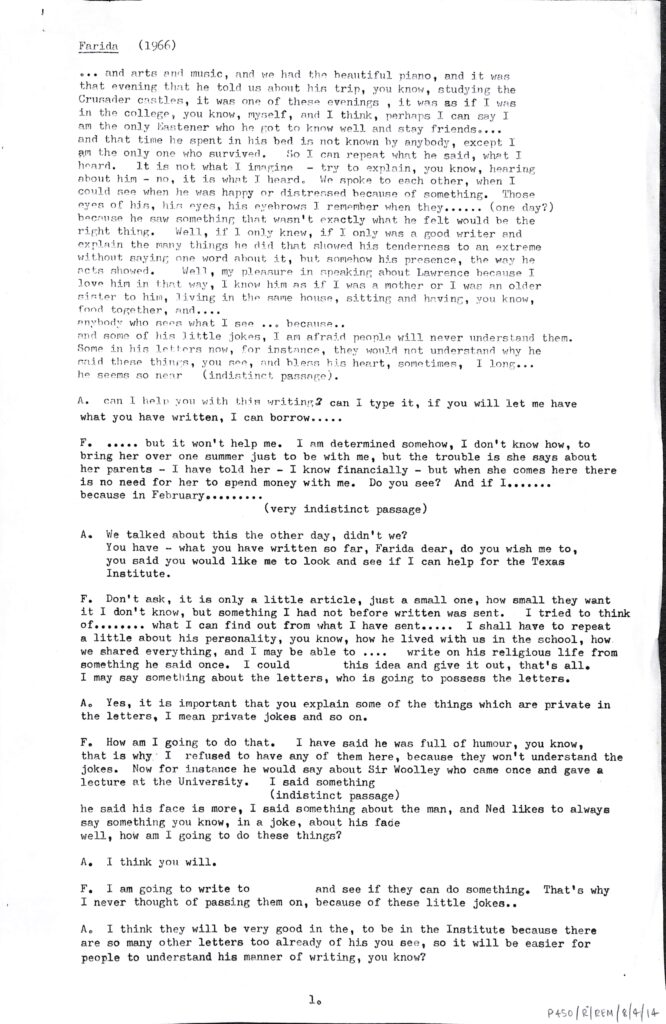



T.W. Beaumont
Tom Beaumont served alongside Lawrence during the Arab Revolt as a machine gunner. He sold Lawrence’s letters to the press during his lifetime, revealing that Lawrence was planning to return to Clouds Hill after leaving the R.A.F. in 1935, causing Lawrence to be met with a crowd of journalists. Beaumont continued to be involved in stories for the Sunday Times after Lawrence’s death, but always claimed to have been an admirer. This photograph of Beaumont in Arab dress was sent to Lilith Friedman in 1969.
Wilson Papers, P450/R/COR/3/3


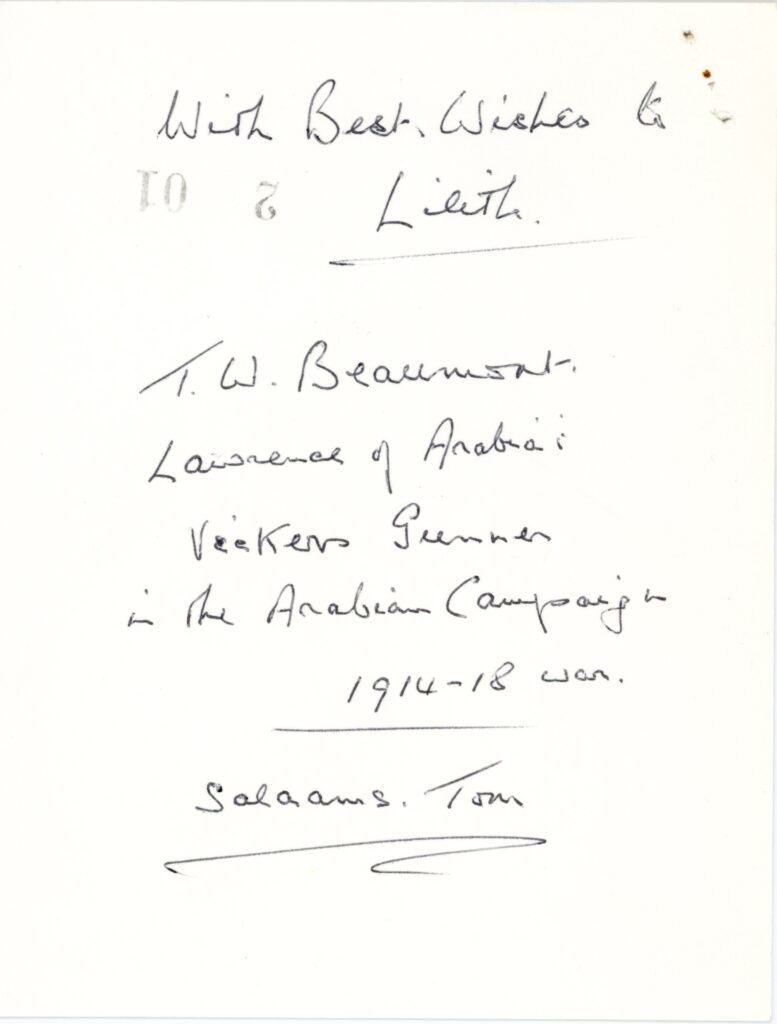
Forgotten Researchers
One of the most remarkable elements of the Jeremy Wilson Archive is the voice it gives to many people who were of importance to Lawrence research during the twentieth century but whose work never resulted in widespread public acknowledgment. Jeremy Wilson acquired the collections of several other researchers, including his long-term assistant, Dr Lilith Friedman, and her friends Arabella Rivington and Helen Cash.
These women, fuelled by a passionate interest in Lawrence, often shared their interviews and archival research with each other. In this period, female researchers carried out tireless research work for large biographical projects on Lawrence that were ultimately authored by men.
A Disagreement with J.B. Priestley
Letter from J.B. Priestley (1894-1984) to Lilith Friedman denying that his character Jock Barniston from his novel, Bright Day, was based on T.E. Lawrence. Priestley explains that he regarded Lawrence as a “deeply divided man” and references the phrase often associated with Lawrence – “backing into the limelight”.
Wilson Papers, P450/R/COR/3/9


R.G. Sims
Flight Lieutenant R.G. Sims was a colleague of Lawrence’s during his last R.A.F. post in Bridlington and took a series of portrait photographs of Lawrence in 1935. In later years, he and his wife Hilda befriended many Lawrence researchers. This letter was sent to Lilith Friedman, and describes Sims’ impressions of Lawrence. Like Priestley, he refers to the phrase “backing into the limelight” but unlike Priestley, Sims strongly admires Lawrence, writing fulsomely in his praise “I was immensely privileged to know a very noble soul, and most understanding sage”. Sims goes on to refer to his written memories of Lawrence, which was later published as “The Sayings and Doings of T.E. Lawrence as heard and experienced by the Sims family”.
Wilson Papers, P450/R/COR/3/11



Arabella Rivington
Arabella Rivington (1911-1972) pursued many public figures for their memories of Lawrence. This draft letter to E.M. Forster resulted in a meeting that was somewhat disappointing.
Wilson Papers, P450/R/COR/5
Photographs of the Middle East by Arabella Rivington c. 1964-1965.
Wilson Papers, P450/R/IAV/1/2





The Little Man at All Souls
This letter from Helen Cash (later Beaumont) to Lilith Friedman concerns a visit to the Lawrence collections at All Souls College where they dressed up a “little man” (probably the College Archivist) in Arab robes. Helen’s letters seamlessly blend passionate Lawrence research with the everyday details of a woman’s working life as a secretary in the 1960s.
Wilson Papers, P450/R/COR/3/3


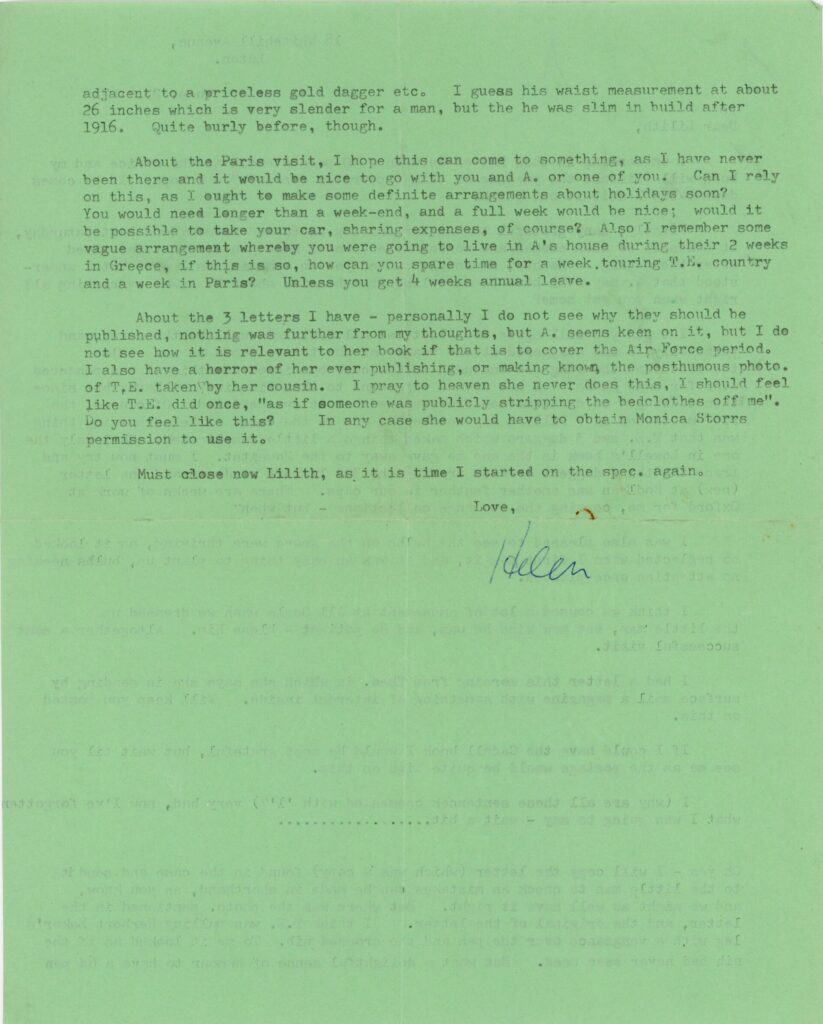
Global Lawrence
The Lawrence legend is popular around the world with particular followings in the USA, France, Japan, Australia, South America and Germany. Much of this interest is generally based on the idea of Lawrence as a flawed “hero”, although his character is seen differently in each culture. Lawrence particularly remains a figure of controversy for those of Middle Eastern heritage.
In his role as a collector and expert on Lawrence, Jeremy Wilson engaged with people from all of these nationalities, and particularly sought to acquire copies of texts on Lawrence in different languages.
Victoria Ocampo
Victoria Ocampo (1890-1979), a prominent Argentinian writer and intellectual, wrote a biography of Lawrence entitled 338171 T.E, referring to Lawrence’s R.A.F. service number. Jeremy Wilson referred to her as Lawrence’s “most extraordinary” biographer. In this letter to Wilson, written in French, she mentions talking about Lawrence with her friend, the French writer and cultural minister André Malraux (1901-1976), who was also fascinated by Lawrence and had died only a few days previously.
Letter: Wilson Papers, P450/R/COR/1/53.
Photograph: Victoria Ocampo by Man Ray, 1929 (facsimile).
Book: 338171: T.E. (Lawrence of Arabia) by Victoria Ocampo. Magd.Lawrence-T. OCA 1942.




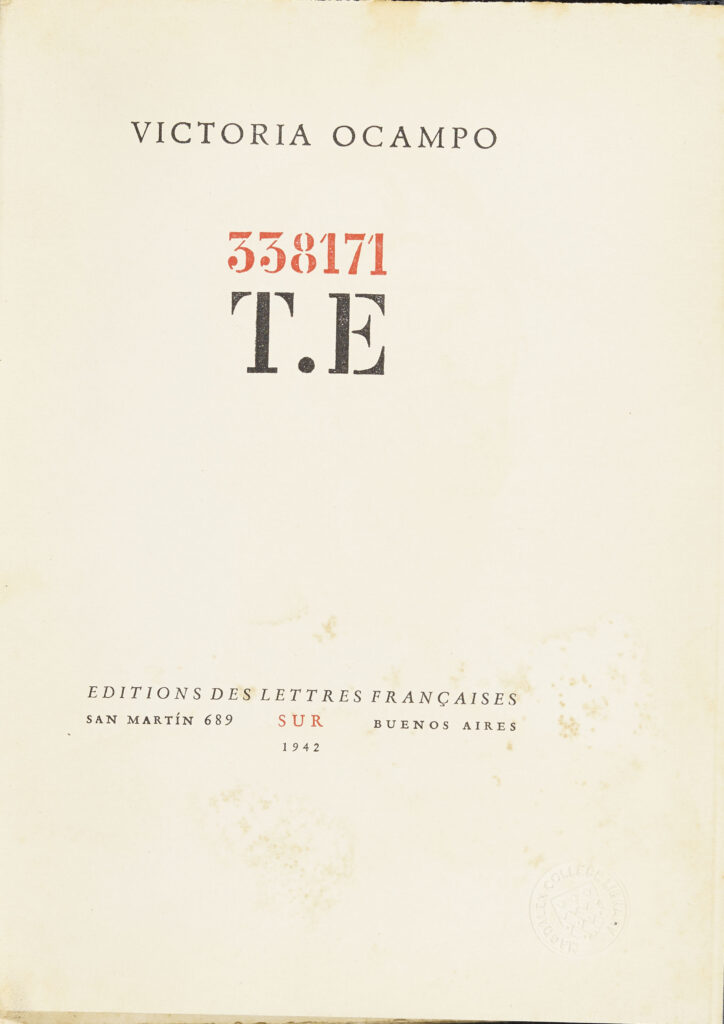

Elie Kedourie
Elie Kedourie (1926-1992) was a British Jewish historian born in Baghdad. Kedourie heavily criticised T.E. Lawrence for his participation in the Arab Revolt, which he saw as motivated by a false idealism perpetuated by the British authorities and their romantic views about Arabs, which in his view, marginalised Iraqi Jews within Arab culture. He outlines his position in this Radio 3 interview from 1985, sent to Jeremy Wilson.
Wilson Papers, P450/R/ORR/2/2/25



Suleiman Mousa
Suleiman Mousa (1919-2008) was a Jordanian historian who wrote the first biography of T.E. Lawrence by an Arab, T.E. Lawrence: An Arab View, in 1967. In his preface, Mousa outlines his criticism of the popular view that Lawrence, a British officer, was the leader of the Arab Revolt, instead arguing for “justice for the Arabs”, who should be placed at the centre of the story. This copy was given by Mousa to the Arabist St. John Armitage, friend of Jeremy Wilson.
Magdalen College Library.


